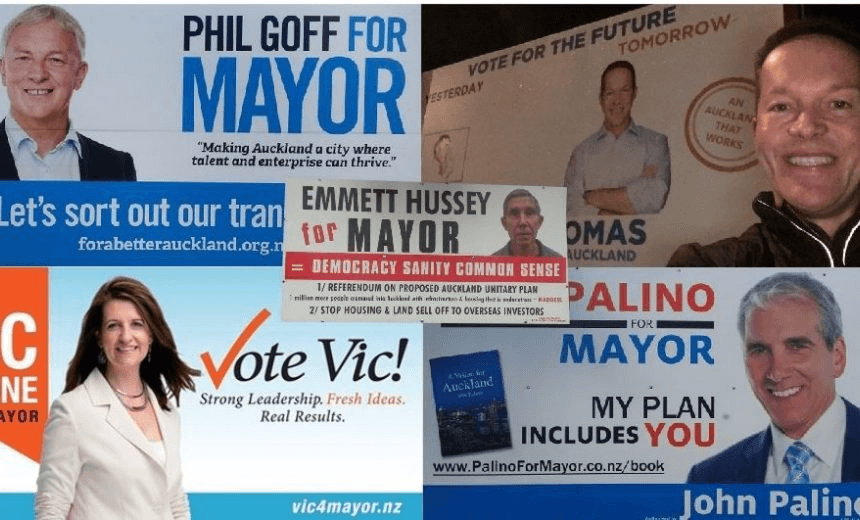Once again, low voter turnout in local body elections has sparked a round of hand-wringing about the public’s lack of political engagement. But is political apathy really the problem, asks Marianne Elliott.
Despite some promising efforts to get people excited about exercising their democratic rights, this year’s local body elections again failed to attract a majority of voters. Preliminary results suggest that just 39.5 percent of eligible voters submitted their papers, down 1.8 percent from 2010.
The common interpretation of low voter turnout is that people in New Zealand, especially young people, are apathetic about politics. There are a few versions of this theory. In the first the assumption is that young people are selfish and superficial, and don’t care about anything except the latest iPhone or Real Housewives Of Auckland episode. Another version of the ‘political apathy’ theory posits that people aren’t engaging in our democracy because they’re comfortable with the status quo.
Obviously many New Zealanders do care about iPhones and RHOAKL, and a good number of us are relatively comfortable. But my work at ‘people powered change’ non-profit ActionStation has consistently presented me with evidence that despite those truths, New Zealanders are far from apathetic.
Over the past two years more than 250,000 New Zealanders of all ages, ethnicities and political persuasion have invested their time, energy and money in campaigns they care about. Although it is true that their first encounter with these campaigns was probably online, usually on Facebook, it would be a mistake to dismiss their engagement as ‘clicktivism’. Having discovered they were not alone in their passion for a particular issue, hundreds of thousands of Kiwis have proven themselves to be anything but apathetic.
They’ve written more than 10,000 individual submissions to Select Committees, made 30,000 phone calls or personal contact with MPs. They have contributed their stories to crowdsourced videos, shown up in person to present petitions, met with Ministers, and built replica Beehives out of food cans. They’ve started their own campaigns on our community site and signed up to be media spokespeople for campaigns they care and know about.
Thousands of people have chipped in cash to fund opinion polling on issues that matter to them. Through these polls they’ve shown government that New Zealanders are not relaxed about multinational companies cheating on their tax contributions, nor are they comfortable with Kiwisaver providers investing in land mines, tobacco or alcohol. They have volunteered their time to sit on a panel of ActionStation members who review new campaign proposals to ensure they are consistent with community values, and give advice and support to the community members launching those campaigns, to improve their chances of success.
All of these acts of democratic engagement have two things in common: a genuine opportunity to influence decisions and the direction of the campaign; and a clear, and citizen-focused, ‘theory of change’ – how each person’s engagement will help create the change they want to see. When we get this right, people know that their leadership, their creative input and their expertise are as welcome as their signatures or donations, and they are convinced that by taking action they can contribute to making change happen.
We don’t always get this right. Sometimes our theory of change is unconvincing, and when it is we find out quickly because people don’t engage with the campaign. Sometimes we fail to respond to people as quickly as we’d like, sometimes we experiment with engagement processes that don’t work as well as we’d hoped. When that happens, though, we don’t blame politically apathetic New Zealanders. We ask what we did wrong, what we could have done better.
Do people not care about this issue? Was the strategy behind this campaign flawed? Was it unclear how each person’s participation would help create change? Or was it clear but unconvincing? Was there a problem with the UX (user experience)? Did we fail in our efforts to give people accessible and meaningful ways to influence the design or strategic direction of the campaign? Was the experience of taking action smooth, did it follow a clear logic?
We see that our job is to make engaging in democracy both easy and worthwhile. Our interpretation of low engagement is not that people don’t care about the issues at stake. We choose to believe people when they tell us how much they care about poverty in New Zealand, or the state of our rivers and streams. Our interpretation is that we can do better at making the process engaging and the strategy compelling and convincing.
People engage when they feel they can make a difference and when they feel valued and heard. They engage when they can connect with and act alongside other people who share their values, and when they believe in both the outcome and the strategy to achieve it.
So rather than another round of complaints about politically apathetic New Zealanders, or a rush to find the silver bullet for low voter turnout – whether your preferred bullet is online or compulsory voting – maybe this year’s low voter turnout in local body elections could trigger a conversation about what we can learn about voting in New Zealand from digital campaigning?
Maybe the question is neither ‘Why don’t New Zealanders care?’ nor ‘How can we compel them to vote even if they don’t care?’, but rather ‘Why are our democratic processes failing to convince people that their participation matters, and that they can make a difference?’. Maybe our democracy needs a clearer, human-centred, theory of change?
Marianne Elliott is the national director of ActionStation.

